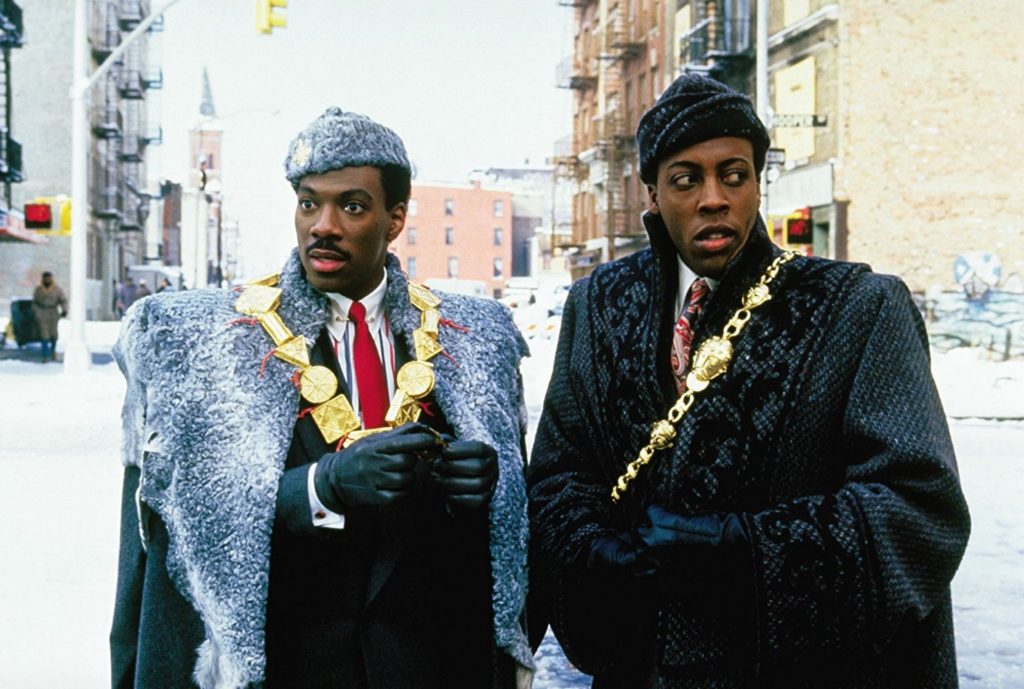Coming to America
How much damage, if any, did "Coming to America" do to a generation of young Americans' views of Africa and Africans?

Eddie Murphy and Arsenio Hall in a still from "Coming to America."
I wanted to start a discussion of Eddie Murphy’s opus, “Coming to America,” which first came out in 1988. I’m interested in this film because it seems to sit at a crossroads of comic genius and ideological disaster. Many people I know have it on their top ten favorite movie list, and I want to understand how we reconcile the things we laugh at with the things that make us cringe. Check out the trailer first.
The film’s premise is enough to make any self-respecting woman cringe. Prince Akeem, played by Murphy, cannot find an intelligent woman in Africa, so he travels to Queens in New York City to find an American woman who will “arouse his intellect as well as his loins.” How’s that for starters?
African women, in particular, have no agency in this film. The African women are voiceless and hyper-sexualized – a direct reflection of colonial mentality. The topless harems “bathe” Akeem every morning are identical to the images of African women that appeared on postcards during colonialism. White men in the bush would send the postcards to other white men back in Europe to brag about the “looseness” of African women. The image of bare-breasted black and brown women was symbolic of dispossession, not to mention demeaning.
Black American women in the film fare no better. Look at this montage of mental cases in the nightclub scene below, and pay close attention to Akeem’s analysis on the street afterward.
The female identities in this scene reflect Murphy’s stand-up comedy in “Raw” from the previous year (1987). In the routine, he warns men that American women are greedy. He jokes that he’ll avoid greedy women by finding a “bush bitch” in Africa. The punch line is that his “bitch” won’t desire anything because she won’t even have pockets. In fact, she’ll be “butt-naked” riding around on a zebra (view this part of “Raw” here).
I want to add that it’s possible that the film’s creators intended to promote a positive image of Africa by depicting a wealthy royal family with gentile mannerisms (the 1980’s were, after all, overrun with “We Are the World” images of starving Ethiopians), but that intent failed. To borrow a phrase from V.Y. Mudimbe, the royal occupants of the palace in Zamunda, as well as the Africans that attend the engagement party are “blackened whites.” They are all stock figures of upper class white European culture of yore (think Jane Austen), but their difference from that culture is marked namely by their blackness.
Other evidence of their difference includes the exaggerated gold jewelry on the women and the metallic details on the men. In other words, the party guests sip on champagne and speak privileged English, while elephants munch on hay and a loud-mouthed merchant sells souvenir dashikis outside – not very Sense and Sensibility.
What we have here is a Western benchmark draped in imagined African-ness, which is to say an ambiguous “Africa.” The ambiguity is not only problematic because it implies that Africa is homogeneous and ahistorical, but also because these are demoralized depictions, with a distinct assault against women.
I’m done now but let me just add that I’m not a robot (10011100). When no one was looking I might have made a noise resembling laughter at certain points during the film. But I wonder: how much ideological damage did “Coming to America” do and still does to Africa, particularly among a generation of young Americans that grew up admiring Eddie Murphy?



















